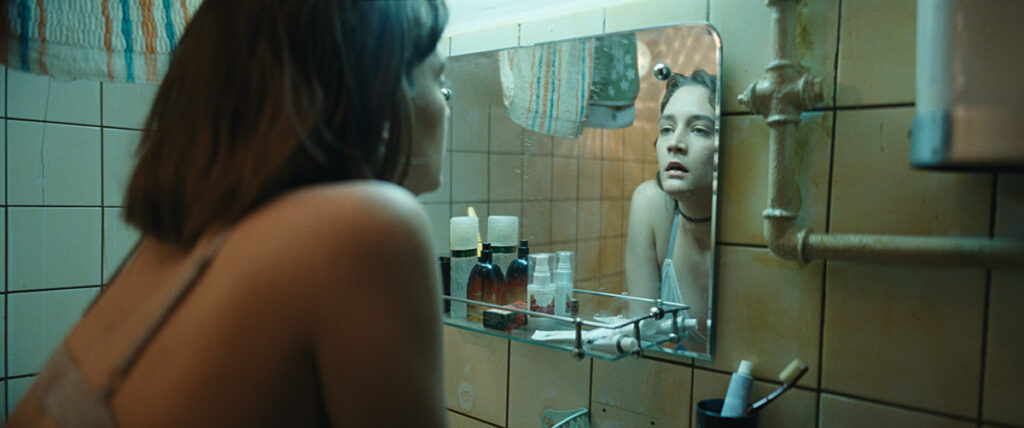Born in Moscow, Vasilisa Kuzmina is a young Russian filmmaker and scriptwriter. After getting a B.F.A. in acting at the Moscow Drama School, Kuzmina debuted as a film director with the web series “Alisa,” which premiered at the SXSW Film Festival in 2020 in the Pilot Competition Program. “Nika” is her first feature film.
“Nika” is screening at the 2022 SXSW Film Festival, which is taking place March 11-20. Find more information on the fest’s website.
W&H: Describe the film for us in your own words.
VK: “Nika” is our first feature inspired by the story of Nika Turbina, a once world-famous Soviet child poet, and by the age of 27, a forgotten girl who fights with her past and for her future.
W&H: What drew you to this story?
VK: I was always fascinated by the strong personality of Nika Turbina — an unconditionally talented, amazing girl — which seemed to resist the inexorable fate all her life. But at the same time, it is not just the private story of the forgotten child poet. No wonder Nika’s story is symptomatic in many ways: many late-Soviet child prodigies did not find a place for themselves in the ’90s, and their lives ended tragically. Besides, now in the era of social media a lot of kids become extremely popular at a really early stage of their lives, and for some it is just impossible to handle.
Therefore, the image of our Nika, although an inspired biography of Nika Turbina, turned out to be to some extent a portrait of the era and the last generations of Soviet children, who in the late ’90s were looking for happiness and themselves in an unrecognizable landscape of the new country. At the same time, [it’s also a look at] today’s popular kids on social media, and their possible ways to cope with that.
W&H: What was the biggest challenge in making the film?
VK: The biggest challenge I suppose was the decision to shoot the movie on 35mm film. In Russia they don’t really shoot on film anymore, but we did our best to persuade our producers to let us do that. We really wanted to maintain a high degree of authenticity, therefore it was important for us to shoot this movie with a moving camera and on film in order to achieve a live, tangible image.
W&H: How did you get your film funded? Share some insights into how you got the film made.
VK: I pitched this project to my professors in film school. They are also producers and owners of a film studio in Russia. And they loved the idea, so they decided to give me that opportunity.
W&H: What inspired you to become a filmmaker?
VK: Wong Kar-wai, David Lynch, Wes Anderson, Woody Allen, Pedro Almodóvar, Andrey Tarkovskiy, Sergei Eisenstein, Quentin Tarantino, Abbas Kiarostami, Paul Thomas Anderson, Michael Haneke, Kira Muratova, Gaspar Noé, Gus Van Sant, Alfred Hitchcock, Stanley Kubrick, Akira Kurosawa, Clint Eastwood, David Fincher, Alice Rohrwacher, Georgiy Daneliya, and Cristi Puiu.
W&H: What’s the best and worst advice you’ve received?
VK: Best: Try not to compromise.
The worst advice, I never remember.
W&H: What advice do you have for other women directors?
VK: JUST DO IT.
W&H: Name your favorite woman-directed film and why.
VK: Tatyana Lioznova’s “Three Poplars on Plyuschikha Street.” The kind of movie Abbas Kiarostami would like.
W&H: How are you adjusting to life during the COVID-19 pandemic? Are you keeping creative, and if so, how?
VK: During the first lockdown, my best friend Yulia Gulyan — who is also a script writer of the movie — and I actually wrote the first draft of “Nika.” So at first I was feeling really grateful for the opportunity to be in silence at home with her, with no rush. But, of course, now everyone is getting tired. I find salvation at my cozy home, with candles, inspiring movies, and Russian literature.
W&H: The film industry has a long history of underrepresenting people of color on screen and behind the scenes and reinforcing — and creating — negative stereotypes. What actions do you think need to be taken to make it more inclusive?
VK: Indeed, there’s a huge problem and unfortunately a long history of underrepresentation in cinema. Every single decision matters, be it casting for a filmmaker or crew-forming for a producer. Moreover, I believe in the power of the word, and I’m sure we should keep talking about it wherever we can. The more we highlight the problem, the more attention we draw, the more real actions are taken.







